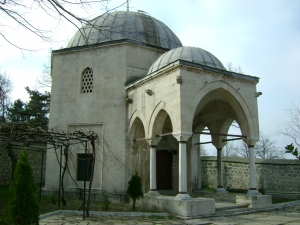
-
 History of Religions
History of the 3 Monotheistic religions (Judaism, Christianity and Islam) and of the main different Christianity confessions (Roman Catholicism, Eastern Catholicism and Eastern Orthodoxy, Anglicanism and Protestantism)
History of Religions
History of the 3 Monotheistic religions (Judaism, Christianity and Islam) and of the main different Christianity confessions (Roman Catholicism, Eastern Catholicism and Eastern Orthodoxy, Anglicanism and Protestantism)
-
 Pedagogical Approaches
New pedagogical approaches to teach history of religion
Pedagogical Approaches
New pedagogical approaches to teach history of religion
-
 Role of Religions in Civilization
How to didactically promote among students of different confessions, the capacity of a critical analysis and understanding of the role played by religions in the history of mankind
Role of Religions in Civilization
How to didactically promote among students of different confessions, the capacity of a critical analysis and understanding of the role played by religions in the history of mankind
-
 Interreligious Students’ Competences
Set of teaching contents, to be used by teachers to highlight and valorize the universal values of tolerance and universalisms that all Monotheistic religions and religious texts contain to promote and sustain mutual understanding among students
Interreligious Students’ Competences
Set of teaching contents, to be used by teachers to highlight and valorize the universal values of tolerance and universalisms that all Monotheistic religions and religious texts contain to promote and sustain mutual understanding among students
-
 Managing Multi-Religious Classes
Teaching Sources to help teachers dealing with multicultural and multi-religious classes
Managing Multi-Religious Classes
Teaching Sources to help teachers dealing with multicultural and multi-religious classes
-
 Introduction
A comparative review of the liturgical celebrations, ceremonies and dietary rules existing in the different religions.
Introduction
A comparative review of the liturgical celebrations, ceremonies and dietary rules existing in the different religions.
-
 Celebrations
Description and comparative analysis of the celebrations of different religions and confessions
Celebrations
Description and comparative analysis of the celebrations of different religions and confessions
-
 Ceremonies
Description and comparative analysis of the ceremonies of different religions and confessions
Ceremonies
Description and comparative analysis of the ceremonies of different religions and confessions
-
 Dietary Rules
Description and comparative analysis of the dietary rules of different religions and confessions
Dietary Rules
Description and comparative analysis of the dietary rules of different religions and confessions
Events
The Pathway through Religions project has been promoted trough conferences and articles.
Partnership
-
 Contractual Partners
From this section it is possible to access to a description of each contractual partner of the Pathway through Religions project.
Contractual Partners
From this section it is possible to access to a description of each contractual partner of the Pathway through Religions project.
-
 Schools
From this section it is possible to access to the information about the schools involved in the Pathway through Religions Project in the European countries involved.
Schools
From this section it is possible to access to the information about the schools involved in the Pathway through Religions Project in the European countries involved.
-
 Associated Partners
As a result of the exploitation activity a number of associated partners officially joined the project in order to contribute to the improvement of the project impact on their target groups and to ensure the project sustainability by continuing using the project deliverables in the next years.
Associated Partners
As a result of the exploitation activity a number of associated partners officially joined the project in order to contribute to the improvement of the project impact on their target groups and to ensure the project sustainability by continuing using the project deliverables in the next years.
This section of the Pathway through Religions portal provides administrative information for the project contractual partners and for the European Commission and it is password protected.
Map
Homepage > ReligiousSite Map > Map

An interactive didactical map interactive didactical map giving access to sites with a religious relevance.
Back to the Religious Sites List

Otman Baba Tekke
Teketo, Haskovo, Bulgaria
DESCRIPTION OF THE RELIGIOUS SITE
- Classroom activity: Examine the shared values and syncretic spiritual practices of diverse religious communities as a basis for tolerance and interfaith dialogue. This could take the form of a discussion and a homework assignment. The topic could also be expanded to a research project encompassing two lessons and two homework assignments. For detailed instructions, refer to Research Project. (https://bit.ly/2vWgylU)
Akyazili Baba tekke - Saint Atanas chapel - Selo Obrochishte, 9630 Bulgaria
Demir Baba Tekke - Sveshtari, Isperih municipality, Razgrad Province, Bulgaria
- History and Philosophy of Religions - Christianity
- History and Philosophy of Religions - Islam
- Multidisciplinary Pedagogical Approaches to Teach History of Religions - Teaching Religion through the Personal Experiences of Prophets and Saints
- Managing Multicultural and Multi-Religious Classes - Cooperative Learning
- Managing Multicultural and Multi-Religious Classes - Interpretative Approach
LINKS
